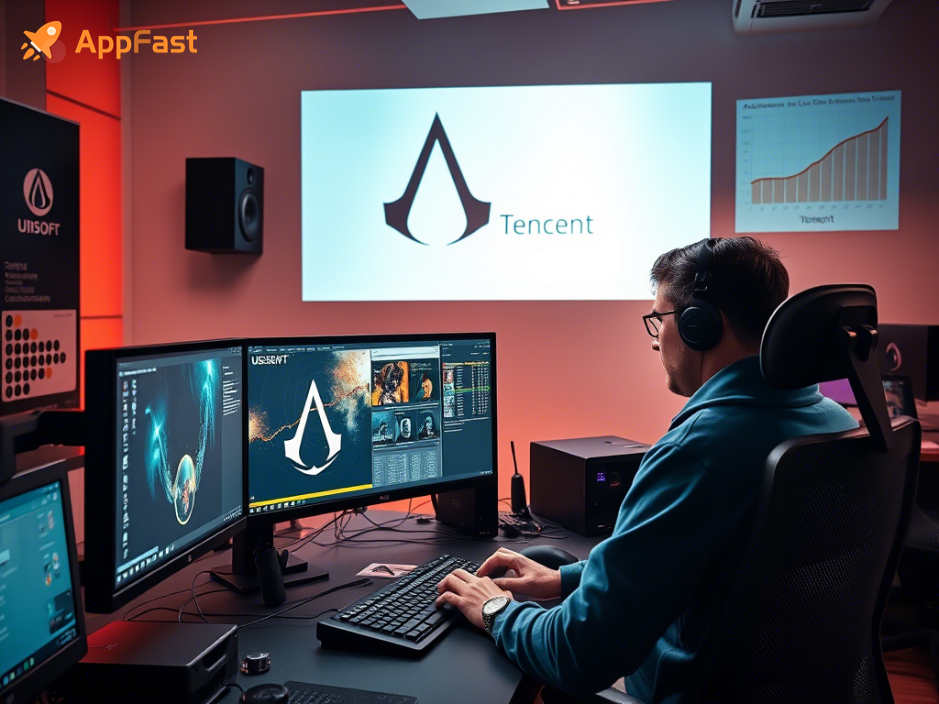
Loading...
Free consultation with ASO specialists
Doing ASO for the first time or have no idea how to carry out targeted optimization of your app?
We offer one-on-one customized services provided by app marketing specialists
Tencent's 1.16 billion euro strategic investment in Ubisoft's new subsidiary
2025-03-31

Tencent's 1.16 billion euro strategic investment in Ubisoft's new subsidiary: A bold gamble to reshape the global gaming landscape
——In-depth analysis of the capital logic, industry upheaval, and future for developers behind the split of three major IPs
Event Summary: Splitting IP to establish a subsidiary, Tencent becomes a key shareholder.
On March 27, 2025, French gaming giant Ubisoft and Tencent jointly announced a landmark deal: Ubisoft will spin off its three flagship IPs - Assassin's Creed, Far Cry, and Rainbow Six - along with their corresponding development teams into an independent subsidiary, and introduce Tencent's strategic investment of €1.16 billion (approximately RMB 89.6 billion). This transaction not only sets a record for the largest single financing in the European gaming industry in recent years but is also seen by the industry as a dual indicator of "traditional 3A game industrial transformation" and "globalization of Chinese capital."
Transaction structure: A carefully designed "derisking" game
According to the announcement, the pre-investment valuation of the new subsidiary reached 4 billion euros (approximately 31.3 billion yuan), equivalent to twice Ubisoft's current market value. Tencent became the second-largest shareholder with a 25% stake, but the terms of the transaction showed that its power was strictly limited:
-
Use of funds: Of the €1.16 billion, some will be used to repay Ubisoft's debt (with a debt ratio as high as 68% by the end of 2024), and the remainder will be invested in the new company's operations.
-
Control rights distribution: Ubisoft retains ownership of the IP and 100% creative decision-making authority, granting its subsidiary only a "global exclusive perpetual IP license" in exchange for royalties.
-
Tencent Rights: Nominated one non-voting board observer and enjoyed financial audit, anti-dilution and other minority shareholder protection clauses.
"This is a typical 'de-risking' design," noted BNP Paribas analyst Julien Lambert. "Ubisoft needs external funding to alleviate financial pressure while avoiding repeating the mistake of 2022's 'Ghost Recon: Wildlands,' where Tencent's involvement led to an extended development cycle."
Capital Logic: Tencent's "Triple Gap" and Ubisoft's "Evergreen Anxiety"
Tencent's Strategy: Filling Strategic Gaps
-
Host/PC ecosystem gap: Despite holding mobile giants like "Honor of Kings," Tencent has long relied on agency in the 3A field (such as the Chinese server of "The Division 2"). This investment will be the first time deeply binding with top IP development chain.
-
Free-to-play (F2P) grafting experiment: According to informed sources, Tencent has planned to adapt the "Rainbow Six" IP into a mobile game with a "pay-for-core + season pass" model to test the acceptance of the Western market.
-
Global IP Matrix: Locking down scarce resources through "technology for IP" to hedge against the impact of emerging forces such as miHoYo's "Genshin Impact" and NetEase's "Naraka: Bladepoint."
Ubisoft's Dilemma: Balancing Survival Pressure and Creative Independence
-
Financial crisis forces reform: By 2024, Ubisoft's market value had dropped by over 50% from its peak in 2022. The development cost of "Assassin's Creed: Shadows" soared to 320 million euros, forcing the Guillemot family to abandon their previously held stance of "complete control."
-
Evergreen Transformation: The new subsidiary will explore "cross-platform service-based games" (such as Assassin's Creed Infinity) to extend the IP lifecycle through continuous content updates.

Industry Shockwaves: Business Model Transformation and Developer Ecosystem Restructuring
-
The hybrid monetization model is accelerating its adoption.
After the deal was announced, Sony announced a similar split evaluation for its God of War studio, while Microsoft was rumored to be negotiating the purchase of a minority stake in Dying Light developer Techland. Analysts predict that within the next three years, 70% of AAA games will adopt a hybrid model of "buy-to-own + in-app purchases + subscription."
-
Developers' voice is challenged.
Although Ubisoft emphasizes "creative independence," it was recently revealed that the development team of "Assassin's Creed: Shadows" had to accept "user experience optimization suggestions" from Tencent. A representative of the French game union warned: "Capital intervention may squeeze the creative space of small and medium-sized studios."
-
Chinese manufacturers upgrade their overseas expansion paradigm.
"Technology for IP" may replace the traditional "agency distribution" and become the new mainstream. NetEase has restarted negotiations with Blizzard to seek joint development rights for the "World of Warcraft" IP, while miHoYo is discussing the mobile adaptation of "Bloodborne" with FromSoftware.
Developer Insight: Opportunity Window in a Crisis
-
Cross-platform skill premium is rising: The demand for cross-platform development talent in Unity and Unreal engines has surged, with compensation packages increasing by 40% compared to 2023.
-
Reevaluation of the Value of Narrative Design: Service-oriented games require continuous content output, and the Far Cry writing team plans to expand by 30%.
-
Compliance risks are increasing: Tencent requires its new subsidiary to adopt its "minor game behavior monitoring system", which may trigger EU data compliance review.
Future Outlook: A Silent Revolution is Unfolding
In the short term, market attention will focus on whether "Rainbow Six Mobile" can replicate the success of "PUBG Mobile" (the project has now entered beta testing). In the long term, this transaction may trigger three major changes:
-
IP Industrial Mass Production: Ubisoft plans to increase the output of IP derivative content by 300% through AI generation technology. A structure similar to "royalties + equity investment" may be emulated by more manufacturers to balance funding needs with creative independence.
-
Deepening of regional operations: The new subsidiary will establish an Asian research and development center in Singapore, specializing in "cultural localization."
-
Regulatory Game Upgraded: The EU's upcoming "Game Content Classification Act" may impose stricter reviews on projects controlled by Chinese capital.
-
Capital flows to mid-sized companies: Studios valued between $1 billion and $5 billion may become hot acquisition targets, especially those with leading IPs in niche markets.
Conclusion
When the hidden blade of "Assassin's Creed" pierces through the boundaries of the traditional gaming industry, the partnership between Tencent and Ubisoft is not just a capital game, but also heralds a new era of "super IP + super platform" for the global gaming industry. For developers, this is both a potential crisis of being alienated by capital and a historic opportunity to cross Eastern and Western markets - as Ubisoft CEO Yves Guillemot said in an internal letter: "We must evolve, or we will become exhibits in a museum."
(Source of this article: Ubisoft official announcement, Tencent financial report, French newspaper Les Echos, Bloomberg)
Related recommendations
